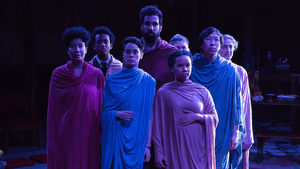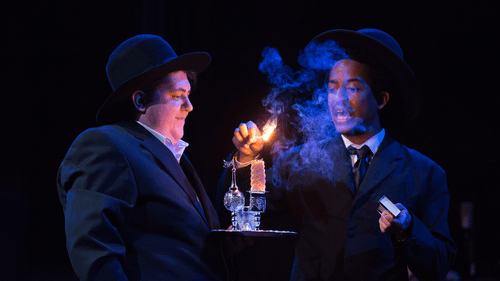Stay in the Loop
BSR publishes on a weekly schedule, with an email newsletter every Wednesday and Thursday morning. There’s no paywall, and subscribing is always free.
Back to shul
Orbiter 3's world premiere of L M Feldman's 'A People'

Don’t be fooled by the mundane title: A People, the seventh and final work produced by the artistic collective Orbiter 3, contains multitudes. L M Feldman’s ambitious, sincere drama sets out to simultaneously chronicle and disrupt how Jewish identity has been formed throughout history.
A People employs a mosaic narrative, mimicking the disconnect and uncertainty its characters feel toward their heritage. This structure becomes a blessing and a curse, as the story’s compelling and interesting parts never gel into a cohesive or entirely satisfying whole.
Two Jews, three opinions
Difference abounds among the large cast (eight actors, plus two additional musicians) and the lives they inhabit (more than 80 distinct personae, according to press materials). Feldman plays with expectations of gender and nationality, history and culture. She shows how observant and secular Jews grapple with their shared past, present, and future.
Carla (Leah Walton, a standout in several roles), a contemporary woman and rabbi’s granddaughter, comes closest to encapsulating the play’s mission statement in one line. “I am not a fig,” she tells a group of male students discussing female purity. “I am not unclean. This was not written by anyone like me.”
Feldman thus writes marginalized voices into the narrative. A People is at its best when it focuses on self-discovery and communion with cultural identity. The most memorable moments include a young lesbian (well played by Bianca Sanchez) coming out to family members with equal parts equivocation and pride. Others feature a bride and her sister, played by Aaron Bell and Jaime Maseda — without any winking overstatement — preparing a mikveh (ritual bath) while also interrogating the reasons for the practice.
In each of these scenes, someone asserts their right to exist within a religious and societal structure that has tried to exclude them. By simply living with authenticity or daring to question dogma, they widen the definition of what it means to be a Jew.
Director Rebecca Wright has a knack for isolating these mini-revelations. They are further accentuated by Mike Inwood’s contemplative lighting and Katherine Fritz’s individuating costumes.

Missing touchstones
Feldman falters somewhat in her treatment of larger issues. The Holocaust is given a passing mention, with Eliana Fabiyi playing Anne Frank for a split second. The Israeli-Palestinian conflict gets a similar nod. Of course, there’s no mandate that works of art centered around Judaism must investigate these topics, but it seems a tease to introduce them and leave them uncharted.
It seems particularly disappointing here because I want to hear what these characters have to say about touchstone events; their conversations wouldn’t be boilerplate. As the arc of history moves farther from the actual events of the Holocaust, do the grandchildren of refugees, survivors, and World War II veterans feel the same gravitational pull toward remembrance? How much space does it occupy in modern Jewish identity? Feldman flirts with these questions, but stops short.
A People loses momentum as it wears on, despite committed acting from a cast that also includes Anita Holland, Richard Chan, and Mal Cherifi. The various puzzle pieces needn’t fit together perfectly, but at a certain point, the outright rejection of narrative starts to feel like sloppiness.
Wright also doesn’t use the playing space — the St. Stephen’s Episcopal Church sanctuary — to its full effect. Most of the action occurs in a semicircle that replicates a traditional theater stage, leaving wide swaths of the auditorium unexplored.
The production also underutilizes the terrific musicians at its disposal. Actor/violinist Fabiyi, clarinetist Larry Goldfinger, and accordionist Anastassia Vertjanova play klezmer-influenced compositions by Daniel Perelstein that accentuate the importance of music in Jewish culture. But they disappear for long periods; when they return, it’s almost as an afterthought.
The mishandled music speaks to the lack of cohesion across the work, of picking things up and putting them down haphazardly. Still, identity is tricky business, and Feldman should be commended for her willingness to get bogged down in the mire of tribalism.
A People doesn’t entirely work as a play, but it admirably sews some new squares into the tapestry of Jewish life.
What, When, Where
A People. By L M Feldman, Rebecca Wright directed. Orbiter 3. Through June 2, 2018, at St. Stephen’s Episcopal Church, 19 S. 10th Street, Philadelphia. orbiter3.org.
Sign up for our newsletter
All of the week's new articles, all in one place. Sign up for the free weekly BSR newsletters, and don't miss a conversation.

 Cameron Kelsall
Cameron Kelsall